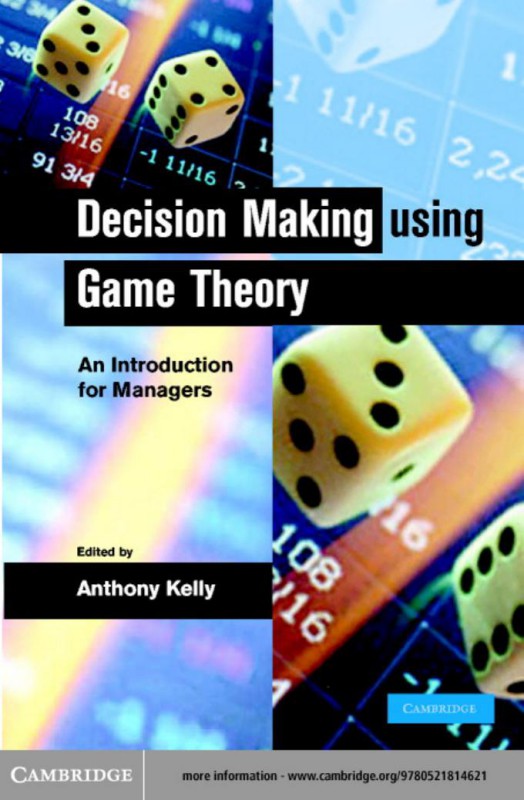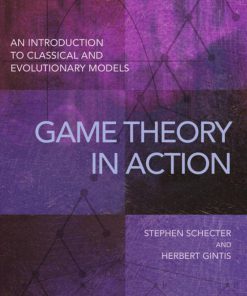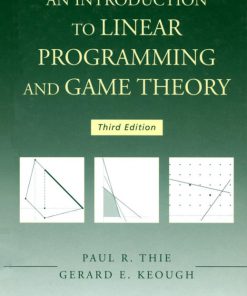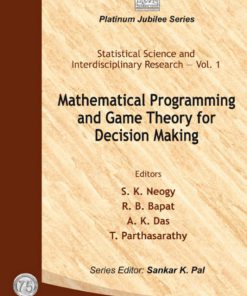Decision Making using Game Theory An introduction for managers 1st Edition by Anthony Kelly ISBN 9780511058615 0511058616
$50.00 Original price was: $50.00.$25.00Current price is: $25.00.
Authors:Anthony Kelly , Series:Gaming [100] , Author sort:Kelly, Anthony , Languages:Languages:eng , Published:Published:Jan 2008 , Publisher:CAMBRIDGE UNIVERSITY PRESS
Decision Making using Game Theory An introduction for managers 1st Edition by Anthony Kelly – Ebook PDF Instant Download/Delivery. 9780511058615 ,0511058616
Full download Decision Making using Game Theory An introduction for managers 1st Edition after payment
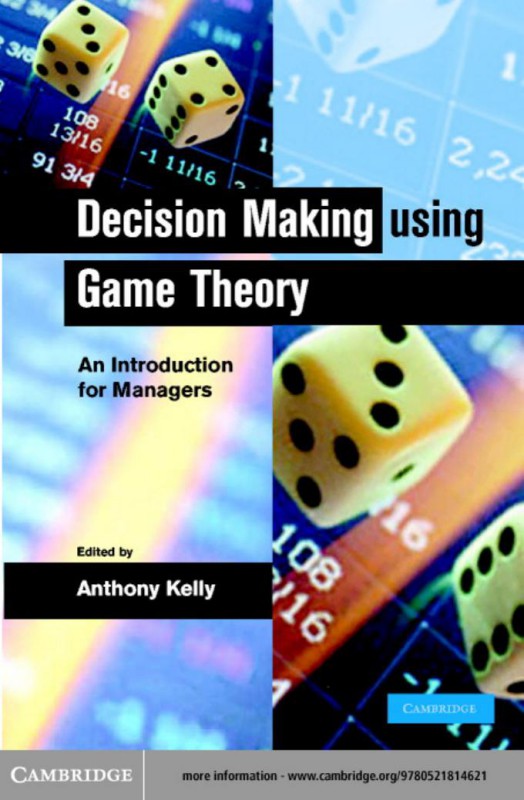
Product details:
ISBN 10: 0511058616
ISBN 13: 9780511058615
Author: Anthony Kelly
Decision Making using Game Theory An introduction for managers 1st Edition Table of contents:
1 Introduction
Terminology
Classifying games
A brief history of game theory
Layout
2 Games of skill
Linear programming, optimisation and basic calculus
The Lagrange method of partial derivatives
3 Games of chance
An introduction to basic probability theory
Expected value, variance and standard deviation
Games of chance involving risk
Utility theory
Games of chance involving uncertainty
4 Sequential decision making and cooperative games of strategy
Representing sequential decision making
Sequential decision making in single-player games
Sequential decision making in single-player games involving uncertainty
Sequential decision making in two-player and multi-player games
Cooperative two-person games
Purely cooperative games
Minimal social situation games
5 Two-person zero-sum games of strategy
Representing zero-sum games
Games with saddle points
Dominance and inadmissibility in large saddle point games
Games with no saddle points
Large matrices generally
Interval and ordinal scales for pay-offs
Games with ordinal pay-offs and saddle points
Games with ordinal pay-offs, but without saddle points
6 Two-person mixed-motive games of strategy
Representing mixed-motive games and the Nash equilibrium
Mixed-motive games without single equilibrium points: archetype 1 – leadership games
Mixed-motive games without single equilibrium points: archetype 2 – heroic games
Mixed-motive games without single equilibrium points: archetype 3 – exploitation games
Mixed-motive games without single equilibrium points: archetype 4 – martyrdom games
Summary of features of mixed-motive prototypes
Leadership games
Heroic games
Exploitation games
Martyrdom games
The Cournot, von Stackelberg and Bertrand duopolies: an interesting application of mixed-motive game
The Cournot duopoly
The von Stackelberg duopoly
The Bertrand duopoly
Solving games without Nash equilibrium points using mixed strategies
7 Repeated games
Infinitely repeated games
Finitely repeated games
Backward induction and its inherent paradox
Avoiding the paradox of backward induction: bounded rationality
Avoiding the paradox of backward induction: multiple Nash equilibria
Avoiding the paradox of backward induction: uncertainty
Avoiding the paradox of backward induction: incomplete information
8 Multi-person games, coalitions and power
Non-cooperative multi-person games
Mixed-motive multi-person games
Partially cooperative multi-person games
Indices of power: measuring influence
Underlying assumptions: sincerity, completeness and transitivity
The Shapley value
The Shapley–Shubik index
An analysis of power on ‘voluntary maintained’ boards (Model A)
Three-faction coalitions
Four-faction coalitions
Grand coalitions
The Shapley value for each faction
The Shapley–Shubik index for each faction
An analysis of power on ‘controlled secondary’ boards (Model B)
Two-faction coalitions
Three-faction coalitions
Grand coalitions
The Shapley value for each faction
The Shapley–Shubik index for each faction
An analysis of power on out-of-state boards (Model C)
Three-faction coalitions
Four-faction coalitions
Grand coalitions
The Shapley value for each faction
The Shapley–Shubik index for each faction
Conclusions
The relative power of major and minor players
The relative power of the minor players
The pay-off for winning coalitions
The order of voting or coalescence
Minimal winning coalitions
Other applications
Implications for forming committees
The Johnston index
The Deegan–Packel index
The Banzhaf index
Summary
9 A critique of game theory
Rationality
Indeterminacy
Inconsistency
Conclusion
A Proof of the minimax theorem
Preamble
Proof: step 1
A graphic model for the game
Proof: step 2
Proof: step 3
Proof: step 4
Proof: step 5
B Proof of Bayes’s theorem
Preamble
Proof
Bibliography
Index
People also search for Decision Making using Game Theory An introduction for managers 1st Edition:
decision making using game theory an introduction for managers
decision making using game theory an introduction for managers pdf
what is game theory in decision making
decision theory vs game theory
You may also like…
eBook PDF
STRATEGY AN INTRODUCTION TO GAME THEORY 1st edition by Joel Watson 0393904067 9780393904062

